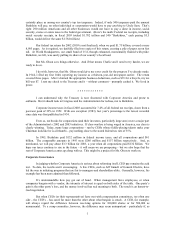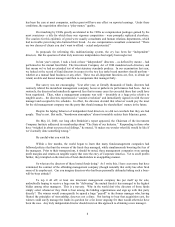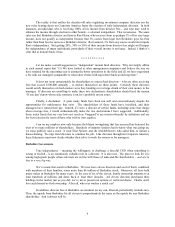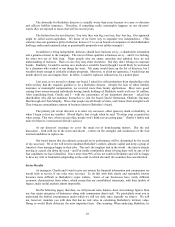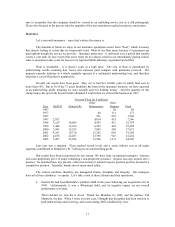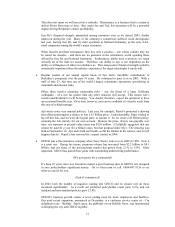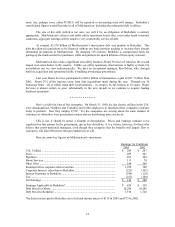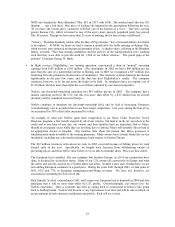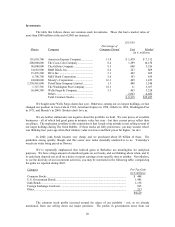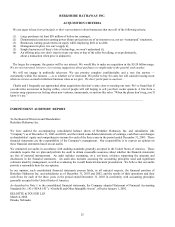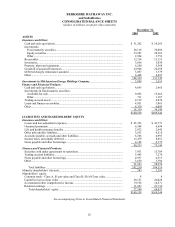Berkshire Hathaway 2003 Annual Report Download - page 17
Download and view the complete annual report
Please find page 17 of the 2003 Berkshire Hathaway annual report below. You can navigate through the pages in the report by either clicking on the pages listed below, or by using the keyword search tool below to find specific information within the annual report.16
Absent this precaution, we would have made larger purchases of stocks that were then
extraordinarily cheap.)
Charlie would have moved swiftly to close down Gen Re Securities – no question about that.
I, however, dithered. As a consequence, our shareholders are paying a far higher price than
was necessary to exit this business.
• Though we include Gen Re’ s sizable life and health reinsurance business in the “insurance”
sector, we show the results for Ajit Jain’ s life and annuity business in this section. That’ s
because this business, in large part, involves arbitraging money. Our annuities range from a
retail product sold directly on the Internet to structured settlements that require us to make
payments for 70 years or more to people severely injured in accidents.
We’ ve realized some extra income in this business because of accelerated principal payments
we received from certain fixed-income securities we had purchased at discounts. This
phenomenon has ended, and earnings are therefore likely to be lower in this segment during
the next few years.
• We have a $604 million investment in Value Capital, a partnership run by Mark Byrne, a
member of a family that has helped Berkshire over the years in many ways. Berkshire is a
limited partner in, and has no say in the management of, Mark’ s enterprise, which specializes
in highly-hedged fixed-income opportunities. Mark is smart and honest and, along with his
family, has a significant investment in Value.
Because of accounting abuses at Enron and elsewhere, rules will soon be instituted that are
likely to require that Value’ s assets and liabilities be consolidated on Berkshire’ s balance
sheet. We regard this requirement as inappropriate, given that Value’ s liabilities – which
usually are above $20 billion – are in no way ours. Over time, other investors will join us as
partners in Value. When enough do, the need for us to consolidate Value will disappear.
• We have told you in the past about Berkadia, the partnership we formed three years ago with
Leucadia to finance and manage the wind-down of Finova, a bankrupt lending operation. The
plan was that we would supply most of the capital and Leucadia would supply most of the
brains. And that’ s the way it has worked. Indeed, Joe Steinberg and Ian Cumming, who
together run Leucadia, have done such a fine job in liquidating Finova’ s portfolio that the $5.6
billion guarantee we took on in connection with the transaction has been extinguished. The
unfortunate byproduct of this fast payoff is that our future income will be much reduced.
Overall, Berkadia has made excellent money for us, and Joe and Ian have been terrific
partners.
• Our leasing businesses are XTRA (transportation equipment) and CORT (office furniture).
Both operations have had poor earnings during the past two years as the recession caused
demand to drop considerably more than was anticipated. They remain leaders in their fields,
and I expect at least a modest improvement in their earnings this year.
• Through our Clayton purchase, we acquired a significant manufactured-housing finance
operation. Clayton, like others in this business, had traditionally securitized the loans it
originated. The practice relieved stress on Clayton’ s balance sheet, but a by-product was the
“front-ending” of income (a result dictated by GAAP).
We are in no hurry to record income, have enormous balance-sheet strength, and believe that
over the long-term the economics of holding our consumer paper are superior to what we can
now realize through securitization. So Clayton has begun to retain its loans.
We believe it’ s appropriate to finance a soundly-selected book of interest-bearing receivables
almost entirely with debt (just as a bank would). Therefore, Berkshire will borrow money to
finance Clayton’ s portfolio and re-lend these funds to Clayton at our cost plus one percentage



